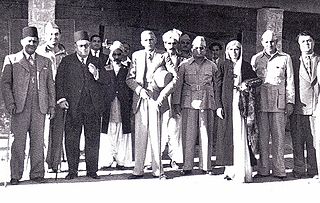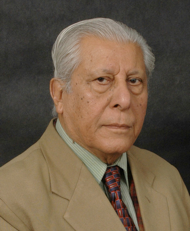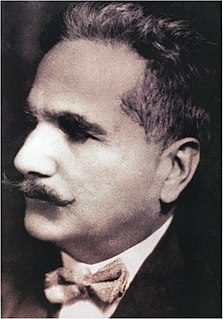Related Research Articles

Sir Syed Ahmed Taqvi bin Syed Muhammad Muttaqi KCSI, commonly known as Sir Syed Ahmed Khan, was an Islamic pragmatist, Islamic reformer, and philosopher of nineteenth century British India. Born into a family with strong debts to the Mughal court, Ahmed studied the Quran and Sciences within the court. He was awarded an honorary LLD from the University of Edinburgh in 1889.

The Reconstruction of Religious Thought in Islam is a compilation of lectures delivered by Muhammad Iqbal on Islamic philosophy and published in 1930. These lectures were delivered by Iqbal in Madras, Hyderabad, and Aligarh. The last chapter, "Is Religion Possible", was added to the book from the 1934 Oxford Edition onwards.

The Pakistani philosophy is the philosophical activity or the philosophical academic output both within Pakistan and abroad. It encompasses the history of philosophy in the state of Pakistan, and its relations with nature, science, logic, culture, religion, and politics since its establishment on August 1947.

Jāvēd Ahmed Ghāmidī is a Pakistani Muslim theologian, Quran scholar, Islamic modernist, exegete and educationist. He is also the founding President of Al-Mawrid Institute of Islamic Sciences and its sister organisation Danish Sara. He became a member of the Council of Islamic Ideology on 28 January 2006, where he remained for a couple of years. He also taught Islamic studies at the Civil Services Academy for more than a decade from 1979 to 1991. He was also a student of the famous Islamic scholar and exegete, Amin Ahsan Islahi. He is running an intellectual movement similar to Wasatiyyah, on the popular electronic media of Pakistan. Currently he is Principal Research Fellow and Chief Patron of Ghamidi Center of Islamic Learning in Dallas, Texas, USA, An Initiative of Al-Mawrid United States.
Anjuman-i-Himayat-i-Islam or Anjuman-e-Himayat-e-Islam is an Islamic intellectual and social welfare organisation with branches both in India and Pakistan. It was founded in Lahore on 24 September 1884 in a mosque known as Masjid Bakan inside Mochi Gate, Lahore, by Khalifa Hameed-ud-Din.
Sayyid Hussain Ahmad Madani was an Indian Islamic scholar. He was among the first recipients of the civilian honour of Padma Bhushan in 1954.

Syed Zafarul Hasan was a prominent twentieth-century Pakistani Muslim philosopher.

Allama Khalid Masud was a Muslim scholar of Pakistan. He spent the major part of his life with Moulana Amin Ahsan Islahi. He conveyed ideas and thoughts of his teacher and Imam Farhi to general public. He wrote a number of books and articles and delivered lectures on Islam, science and other subjects.
Saadat Saeed is a professor of Urdu language and literature at Government College University, Lahore and contemporary critic and poet of Urdu language.
Zafar Ishaq Ansari was a scholar of Islamic Studies. He was the Director General of the Islamic Research Institute of the International Islamic University. Previously, he was the President of the International Islamic University Islamabad. He has published books and articles, and has spoken at international conferences on Islamic Studies and inter-religious dialogue.
Dr. Hafeez Malik was a Pakistan-American political scientist and the professor of political science at Villanova University in Pennsylvania.
Qazi Mian Muhammad Amjad, was a legal scholar of Qur'an, Hadith, and the Hanafi school of Islamic law.

Jamal Khwaja is a retired Indian philosopher.
Mahmood Ahmad Ghazi was a Pakistani jurist and scholar of Islamic Studies, shariah and fiqh. He was a professor at the International Islamic University, Islamabad, judge at the Federal Shariat Court and Federal Minister for Religious Affairs in Pakistan. He completed his dars-e-nizami at the age of 16 and later obtained a PhD in Islamic Studies from Punjab University. He was fluent in Urdu, English, Arabic, Persian, Turkish and French. He authored numerous works in Urdu and English, and translated Persian poetry Payam-e-Mashriq of Muhammad Iqbal into Arabic.
Khan Bahadur S. Hakim Ahmad Shuja, MBE, was a famous Urdu and Persian poet, playwright, writer, film writer and lyricist, scholar and mystic, from former British India, later Pakistan.

Sir Allama Muhammad Iqbal, known as Allama Iqbal, was a poet, philosopher, theorist, and barrister in British India. He has been called the "Spiritual Father of Pakistan" for his contributions to the nation. Iqbal's poems, political contributions, and academic and scholarly research were distinguished. He inspired the Pakistan movement in British India and is considered a renowned figure of Urdu literature, although he wrote in both Urdu and Persian.
Raja Hassan Akhtar; was a political worker in the Pakistan Muslim League prior to the independence of Pakistan in 1947. After independence, he was a Member Pakistan National Assembly (MNA), President, West Pakistan Muslim League, Vice President, All Pakistan Muslim League, and Tehrik–e–Pakistan Gold Medalist
Muhammad Ayub Sabir is a Pakistani writer. He has received Pride of Performance award from Government of Pakistan for his literary works.
Mian Mohammad Sharif TI, best known as Professor M. M. Sharif, was an influential Pakistani philosopher, clergyman, and college professor. He is noted for his notable work in analytical philosophy and pioneered the idea of Muslim philosophy. He wrote on this subject and his work was published in international philosophical journals.
References
- ↑ Ahmad, Naeem (1998). Philosophy in Pakistan. Council for Research in Values and Philosophy. p. 291. ISBN 978-1-56518-108-3.